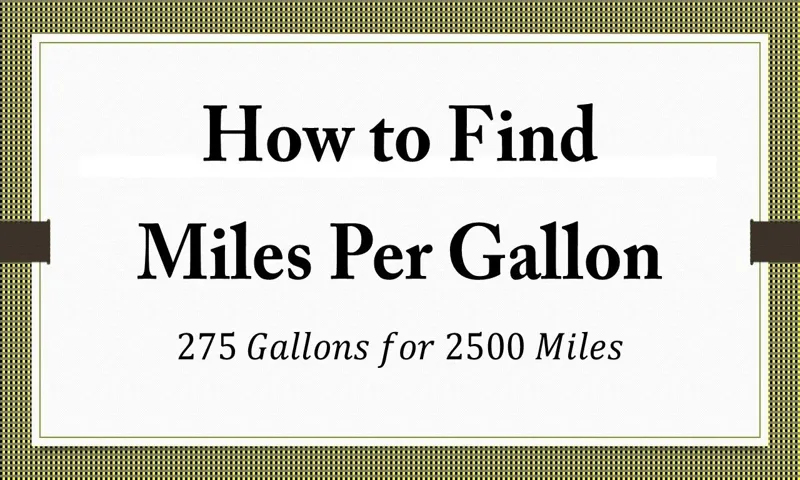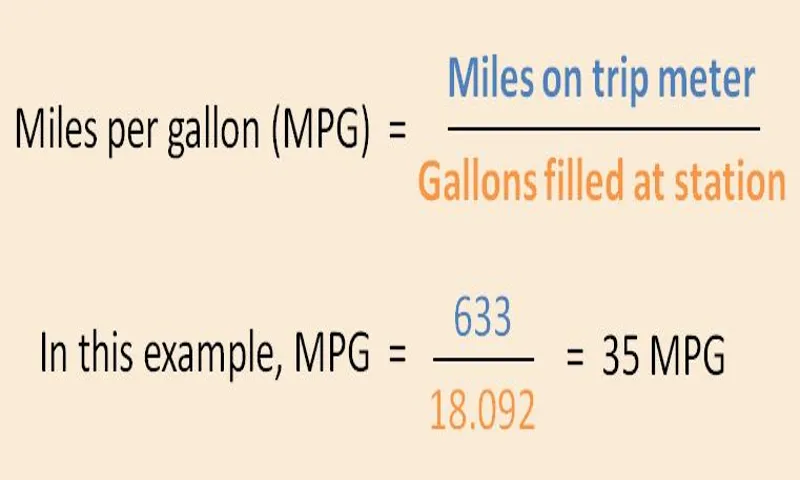As a car owner or driver, getting the best fuel economy from your vehicle is a top priority. Miles per gallon (MPG) is a popular measure of fuel efficiency, and understanding how it works can help you save money on gas and reduce your carbon footprint. But what exactly is MPG? How does it differ between car models and driving conditions? And what are some tips for improving your MPG? In this blog post, we’ll dive into the topic of understanding miles per gallon and equip you with the knowledge you need to make smart driving decisions.
Whether you’re a seasoned driver or just starting out, this guide will help you navigate the world of MPG and get the most out of your car’s gas tank.
Table of Contents
What is Miles per Gallon?
Miles per gallon (MPG) is a measurement used to determine a vehicle’s fuel efficiency. It stands for the number of miles a vehicle can travel on a single gallon of fuel. MPG is an important factor to consider when buying a car, especially for those who drive frequently or long distances.
A higher MPG indicates that a car consumes less fuel for every mile traveled, which means savings on gas expenses in the long run. However, factors such as driving style, vehicle weight, weather conditions, and terrain can affect the actual MPG achieved by a car. It’s important to note that MPG is not the only factor that determines fuel efficiency and should be considered along with other factors, such as engine size and transmission type.
Defining the Term
Miles per gallon, or MPG, is a unit of measurement used to determine the efficiency of a vehicle’s fuel consumption. It measures the distance traveled in miles per unit of fuel consumed, typically in gallons. The higher the MPG, the more efficient the vehicle is in consuming fuel, resulting in fewer emissions and lower fuel costs.
For example, a car with an MPG rating of 30 can travel 30 miles on a single gallon of fuel. It’s important to note that MPG can vary depending on driving conditions, such as traffic and weather, as well as the driver’s behavior, such as accelerating and braking habits. As we move towards a more sustainable future, MPG has become an important factor for consumers when considering purchasing a vehicle.

Key Components of MPG
Miles per gallon (MPG) is a crucial metric for measuring the fuel efficiency of a vehicle. It is a unit of measurement that represents the number of miles a car can travel on one gallon of fuel. A higher MPG indicates that the car is more fuel-efficient, while a lower MPG suggests that it consumes more fuel.
The key components of MPG include vehicle weight, engine size, and fuel type. A lighter car tends to have higher MPG, and a smaller engine size is also more fuel-efficient. Additionally, the choice of fuel type can affect MPG, with diesel fuel giving better mileage than gasoline.
Factors such as driving habits, terrain, and weather conditions can also impact MPG. In the end, understanding MPG is vital for making informed decisions about the fuel efficiency of vehicles and choosing those that provide the best value.
Calculating Miles per Gallon
“What does miles per gallon mean?” is a common question when it comes to measuring a vehicle’s fuel efficiency. Essentially, miles per gallon, or mpg, refers to the number of miles a vehicle can travel on one gallon of fuel. The higher the mpg, the more fuel-efficient the vehicle is considered to be.
It’s important to keep in mind that driving habits, traffic conditions, and vehicle maintenance can all impact a vehicle’s mpg. It’s also worth noting that electric and hybrid vehicles often use different measurements, such as miles per kilowatt-hour or MPGe, to convey their fuel efficiency. It’s always a good idea to research and compare different vehicles’ fuel efficiency to make an informed decision about which one is right for you.
Formula for MPG
When it comes to calculating miles per gallon (MPG), there’s a simple formula that you can use to determine your vehicle’s fuel efficiency. In essence, MPG represents the number of miles that your car can travel using one gallon of fuel. To calculate your car’s MPG, all you need to do is divide the number of miles you’re able to drive by the number of gallons of fuel that it takes to fill up your tank.
For instance, if you drove 300 miles on 10 gallons of fuel, your MPG would be 30. This formula can help you determine whether you’re getting the most out of your fuel purchases and help you keep track of your car’s fuel efficiency over time. By utilizing this formula for calculating MPG, you can ensure that you’re staying on top of your vehicle’s fuel consumption and ultimately save money at the pump.
Examples of MPG Calculations
Calculating Miles per Gallon Calculating MPG is a critical aspect of driving and owning a car. It helps you to understand how your car is performing and whether it needs maintenance or tuning. MPG calculations are quite simple; you just need to know the distance traveled and the amount of fuel consumed.
For instance, if you traveled 120 miles and consumed 4 gallons of gas, then your MPG is 30. You can also calculate MPG based on the fuel pump. To do this, start by filling your tank and recording the number of gallons you use and the odometer reading.
The next time you fill up, record that odometer reading and the number of gallons used. Subtract the first odometer reading from the second and divide by the number of gallons used. This simple formula will give you the MPG for your vehicle.
By understanding your car’s MPG, you can adjust your driving habits, maintain your vehicle better, and ultimately save money by improving fuel efficiency.
Factors Affecting MPG
Calculating Miles per Gallon is an essential aspect of determining how efficiently a vehicle uses fuel. MPG, or miles per gallon, is a measure of how many miles your car can travel per gallon of fuel. The calculation is pretty straightforward and can be done by dividing the number of miles driven by the amount of fuel consumed.
However, several factors can affect the accuracy of MPG measurements, making it crucial to pay attention to all of them. For instance, weather conditions such as strong winds or extreme temperatures can significantly affect your MPG, leading to inaccurate measurements. Additionally, the type of fuel, the car’s age and condition, tire pressure, and driving habits can all affect your MPG.
As such, it’s vital to pay close attention to these factors and make adjustments accordingly to ensure your car is running as efficiently as possible.
Why is MPG Important?
Miles per gallon (MPG) is a measure of fuel efficiency that indicates the number of miles a vehicle can travel with one gallon of fuel. This figure is important for several reasons. First, it helps drivers estimate how much fuel they will need for a given journey, allowing them to plan their trips more effectively and budget for fuel costs.
Additionally, knowing your vehicle’s MPG can help you make more informed decisions about what type of car to buy, with more fuel-efficient models often being more cost-effective in the long run. Furthermore, MPG is closely tied to environmental concerns, with higher fuel efficiency leading to lower emissions and a reduced impact on the planet. Overall, understanding what miles per gallon means and why it is important can help you stay on top of your driving expenses and make more sustainable choices for yourself and the environment.
Environmental Impact
MPG is a critical factor that affects the environment. As we all know, vehicles are the biggest contributors to air pollution. The more fuel a car consumes, the more emissions are released into the atmosphere, and consequently, the environment suffers.
MPG, which stands for Miles Per Gallon, is a measure of how much mileage a vehicle can get out of a gallon of fuel. The higher the MPG, the more efficient the car is at using fuel, which can reduce the amount of pollution released into the air. Therefore, having a high MPG is essential in helping to reduce the impact of vehicles on the environment.
It is vital to seek out cars with higher MPG ratings, as they can make a significant contribution to reducing the environmental impact of transportation on our planet.
Economic Impact
MPG, Economic Impact As gas prices continue to rise and climate change becomes a pressing issue, the importance of MPG (miles per gallon) cannot be overstated. MPG is the measure of how many miles your vehicle can travel on a single gallon of gas. A higher MPG means you can go further without having to fill up your tank, which can save you money in the long run.
Additionally, cars with higher MPG ratings generally emit less carbon dioxide, which can help reduce our impact on the environment. On a larger scale, increasing MPG standards for vehicles can also have a positive economic impact by reducing our dependence on foreign oil. By using less fuel, we decrease the amount of money we spend on foreign imports and keep more money within our own economy.
In essence, the importance of MPG cannot be understated as it not only saves us money but also contributes to a healthier environment and a stronger economy.
Conclusion
In conclusion, miles per gallon is a measure of how far a car can go with a certain amount of fuel. It’s like asking your significant other how far you can run on a limited amount of patience. So the next time you’re at the gas pump, remember that a higher number of miles per gallon means you can go further on less fuel and maybe save enough money for a romantic dinner that won’t end in running out of gas on the way home.
“
FAQs
What is the definition of miles per gallon (MPG)?
Miles per gallon (MPG) is a measure of how far a vehicle can travel with one gallon of fuel. It is calculated by dividing the number of miles driven by the amount of fuel used.
How important is MPG when choosing a car?
MPG is an important factor to consider when choosing a car, especially if you are looking to save money on fuel costs. The higher the MPG, the less money you will spend on gas.
How does driving style affect MPG?
Your driving style can have a big impact on your MPG. Aggressive driving, frequent acceleration and braking, and driving at high speeds can all lower your MPG.
What is the difference between city and highway MPG?
City MPG is a measure of a vehicle’s fuel efficiency when driving in stop-and-go traffic, while highway MPG is a measure of fuel efficiency when driving at high speeds on highways.
How can I improve my car’s MPG?
You can improve your car’s MPG by maintaining proper tire pressure, driving at a consistent speed, avoiding rapid acceleration and braking, and keeping your vehicle well-maintained.
Are electric cars more fuel-efficient than gas-powered cars?
Yes, electric cars are generally more fuel-efficient than gas-powered cars because they use electricity instead of gasoline. However, the cost savings may vary depending on the price of electricity in your area.
What other factors can affect my car’s MPG?
Other factors that can affect your car’s MPG include the weight of your vehicle, the size of its engine, the type of fuel you use, and the aerodynamics of your car.


